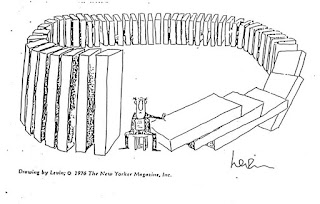Can the Corona Crisis Change the World - Forever?
Amidst the global uncertainty, fear and turmoil that the Corona pandemic has brought to the world, it is difficult to discern any long-term positives from this crisis. No doubt, the systemic effects of the pandemic, be it loss of lives, economic downturns, financial hardships, or psychological stresses will be felt by all for a long time to come.
Yet, history has abundant examples of
resilient societies emerging out of crises –
stronger and more
progressive. The Black Death of the 14th century – one of the most destructive pandemics in human history – decimated about one third of Europe’s population. Yet its social, political,
economic, and religious consequences changed the course of history. The 15th century Europe
became a “golden age”, bringing an end to serfdom, questioning religious
traditions and dogmas, and paving the way for scientific discoveries and social
and economic opportunities for masses.
The American Civil War, while devastating, it forged the disparate and
secessionist Union states into a strong, united and progressive nation.
Only in the last century, yet long forgotten, was the
Influenza (Spanish Flu) pandemic, which, within two years (1918 -1920), infected about a quarter of the world's population and killed an estimated 50 to
100 million – around 2 to 4 times more than the preceding WWI death
toll! WWI caused the downfall of four
empires and signaled the end of colonialism. Women entered the workforce in droves and scientific research accelerated. The League of Nations was
formed as an international body for collective security and peace – a first in human history.
Fortunately, with today’s advanced medical sciences, it is unlikely that humanity will face similar fates. However, the pandemic has exposed several fatal shortcomings in global governance and institutions – the most fundamental one being our thinking – as fragmented nationalistic mindsets still persist today. What Corona crisis is teaching us is that national boundaries cannot prevent diseases, climate calamity, financial breakdown, and the flow of people, products and services. Humanity is deeply and intrinsically interdependent, and, today, human affairs are irreversibly interconnected. World leaders are slowly and painfully learning that this crisis and other global battles can only be won by working together and not in isolation – one for all and all for one. Perhaps they could reflect on the fact that the trillions of dollars spent on ‘defense’ are worthless when the enemy is not another human. And that in future we will need more nurses than soldiers.
Fortunately, with today’s advanced medical sciences, it is unlikely that humanity will face similar fates. However, the pandemic has exposed several fatal shortcomings in global governance and institutions – the most fundamental one being our thinking – as fragmented nationalistic mindsets still persist today. What Corona crisis is teaching us is that national boundaries cannot prevent diseases, climate calamity, financial breakdown, and the flow of people, products and services. Humanity is deeply and intrinsically interdependent, and, today, human affairs are irreversibly interconnected. World leaders are slowly and painfully learning that this crisis and other global battles can only be won by working together and not in isolation – one for all and all for one. Perhaps they could reflect on the fact that the trillions of dollars spent on ‘defense’ are worthless when the enemy is not another human. And that in future we will need more nurses than soldiers.
The good news is that we are beginning
to see the glimmering of a new mindset. The scientists who are tirelessly collaborating across the globe on developing a COVID-19 vaccine are not doing it for fame, IP or its
potential commercial windfalls – they just want to save lives. A recent section in a financial news read: “Central
Banks around the world had previously been caught up in a race to the bottom
with respect to interest rates. Now with the onset of Corona virus [while the
race is still on] countries are working together to try to prop global growth
back up, rather than trying to lower their currencies to attain a relative
trade advantage at the expense of someone else.”
Recently, the Chinese Government sent thousands of boxes
of masks as gifts to Italians. There was a message on every box which read: “We
are waves of the same sea, leaves of the same tree, flowers of the same garden.”
Could a new world order emerge from the Corona ruins? If this mindset becomes a contagion – that the people and leaders see the world as “one country and
mankind its citizens”, then future historians might view this crisis as the
‘transformative disruption’ of a new age.
This could become our new
normal – hopefully!
Kambiz Maani, Bsc., Msc., PhD
Author, Educator, Thought Leader
Professor of Systems Thinking and Complexity
Fmr Foundation Chair in Systems Thinking &
Practice
The University of Queensland (UQ), Australia





Today we live in a vastly different world – with far greater levels of interaction and integration. This unprecedented interdependence increases both complexity and vulnerability – parts relying on each other. Hence, the collective choices we make can lead to rosier or bleaker futures.
ReplyDeleteThe calamities of the past have also produced negative unintended consequences. But the overall trajectory of humanity’s progress has been upward and positive. This is marked by mankind’s steady social and economic evolution from tribal, to city state and, now, to nationhood. At every stage, this has been achieved by societies adhering to a higher level of unity and cohesion. The key question and choice before us now are whether we must stop at this level of unity (nationhood), or there will be an inevitable advance to the next level of unity – a global cohesion and governance. The challenges we face today as human species makes me think that we are ready for this next level. This is my source of optimism for the future.